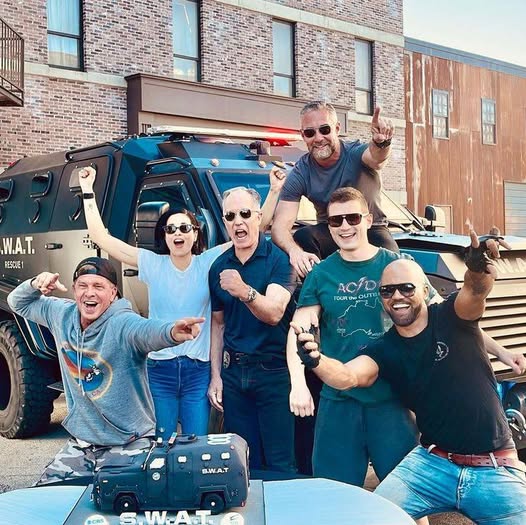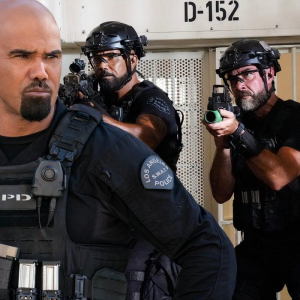The journey of S.W.A.T. from a niche 1970s television series to a multifaceted, culturally resonant global franchise is a remarkable testament to adaptability and enduring appeal. Far from being a mere nostalgic revival, S.W.A.T. has consistently reinvented itself, tackling contemporary issues while retaining the high-octane action that defines its legacy, cementing its place as one of the most compelling action dramas of recent decades.
The genesis of the S.W.A.T. phenomenon lies in its original incarnation, which premiered in 1975 on ABC. Produced by the prolific duo Aaron Spelling and Leonard Goldberg, this series plunged audiences into the intense world of a Special Weapons and Tactics unit operating in Los Angeles. Led by the iconic Lt. Dan “Hondo” Harrelson, played by Steve Forrest, the show quickly gained a following for its gritty, urban police drama and its undeniably catchy theme song. Despite its unique premise and pulse-pounding action, S.W.A.T. was ahead of its time in its depiction of violence, leading to significant backlash from media watchdogs. This controversy ultimately contributed to its early cancellation after just two seasons in 1976, relegating it largely to the annals of cult television history.
For decades, S.W.A.T. remained largely out of the mainstream spotlight, resurfacing occasionally in pop culture references or in reruns for its devoted, albeit small, fan base. However, the allure of its concept proved too strong for Hollywood to ignore indefinitely, leading to its first major revival attempt on the big screen in 2003. Columbia Pictures released a feature film adaptation, aiming to modernize the franchise for a new generation with a substantial budget and a star-studded cast. The film boasted Samuel L. Jackson as the new Hondo, alongside Colin Farrell as the rebellious Jim Street and LL Cool J as the grounded Deacon Kaye. The plot centered on a disgraced LAPD officer, Street, who gets a second chance to join Hondo’s elite S.W.A.T. team. Their first major assignment involves escorting a notorious international drug kingpin, Alex Montel, who brazenly offers a $100 million reward to anyone who can break him out of police custody. This premise unleashed a city-wide manhunt, forcing Hondo’s team to navigate escalating threats, betrayals from within, and a daring final confrontation on a plane. The film was packed with explosive action sequences, showcasing modern tactical maneuvers and high-stakes shootouts designed for cinematic impact. While it performed decently at the box office, it garnered mixed reviews from critics, who praised its action but often criticized its plot as generic or its characters as underdeveloped compared to its predecessors. It failed to spark the broader cinematic franchise that the studio had hoped for, once again suggesting that S.W.A.T. might be destined for obscurity.

However, the most significant and successful reinvention of the S.W.A.T. franchise arrived in 2017 with a new CBS television series. Initial expectations were tempered, but the casting of Shemar Moore, a fan-favorite from Criminal Minds, as the new Sgt. Daniel “Hondo” Harrelson, fundamentally shifted the show’s trajectory. Moore brought an unparalleled blend of charisma, gravitas, and genuine heart to the role, transforming the series from a conventional police procedural into a deeply compelling, socially-conscious action drama.
What truly propelled this reboot to widespread success was its willingness to confront timely and complex societal issues head-on, setting it apart from its predecessors. Unlike earlier versions, the 2017 S.W.A.T. courageously tackled topics such as police brutality, racial tensions, urban inequality, community engagement, and the critical importance of officer wellness, including the psychological toll of the job like PTSD. The show wasn’t content with merely depicting tactical raids; it delved into the complex aftermath, exploring the reasons behind the crimes, the impact on communities, and the internal struggles of the officers themselves. For instance, episodes frequently portray Hondo acting as a crucial bridge between law enforcement and the communities they serve, often questioning the systemic issues that lead to conflict rather than simply enforcing the law blindly. This progressive narrative approach allowed the series to resonate deeply with contemporary audiences grappling with similar real-world challenges.
The success was further amplified by a meticulously crafted and remarkably diverse ensemble cast, each member contributing significant depth and emotional resonance. Jay Harrington as David “Deacon” Kaye portrays the steadfast, family-oriented veteran, often grappling with the moral compromises of the job. Lina Esco’s Christina “Chris” Alonso broke barriers as a bisexual female S.W.A.T. officer, her journey exploring themes of identity, leadership, and personal sacrifice within a male-dominated field. Alex Russell’s Jim Street, much like his film counterpart, starts as a hot-headed rule-breaker but undergoes a profound journey of maturation and redemption, learning the value of teamwork and discipline. David Lim’s Victor Tan, Kenny Johnson’s Dominique Luca, and Patrick St. Esprit’s Commander Robert Hicks round out a team whose individual backstories, emotional arcs, and growth are as integral to the show as the high-octane missions. Their personal lives and interpersonal dynamics provided a rich tapestry that grounded the action in relatable human experiences, ensuring that audiences invested not just in the outcomes of the missions, but in the well-being and development of the characters themselves.

The series masterfully balanced adrenaline-fueled action sequences with profound emotional depth. Whether it was a tense hostage negotiation, a sprawling pursuit of a terrorist cell, or a volatile gang war in the streets of Los Angeles, S.W.A.T. consistently delivered big-budget thrills. Yet, these spectacles were always intertwined with the human element. Shemar Moore’s Hondo wasn’t just a commanding leader; he was a mentor, a confidant, and a man constantly questioning and navigating the ethical complexities of the system he served. His personal struggles, from navigating new relationships to dealing with the emotional weight of community issues, provided an empathetic core that elevated the show beyond mere procedural entertainment. This blend ensured that S.W.A.T. was not only entertaining but also thought-provoking.
The reboot’s compelling storytelling and magnetic cast quickly translated into global popularity. S.W.A.T. became a worldwide syndication powerhouse, broadcast in over 100 countries. This international reach not only broadened its audience but also solidified its financial viability, paving the way for more seasons, increased budgets, and a deeper exploration of its characters and themes.
However, even with its immense success, the series faced an unexpected hurdle in 2023 when CBS announced its cancellation after its sixth season, citing budget concerns. The decision ignited an unprecedented outpouring of fan outrage, amplified by Shemar Moore himself, who vocally championed the show’s positive social impact and economic contributions. The intensity of this backlash, combined with diligent advocacy, led CBS to an exceedingly rare reversal, granting S.W.A.T. a seventh and final season. This extraordinary reprieve underscored the profound connection the show had forged with its audience and the industry’s recognition of its value.

The journey of S.W.A.T. did not end with its seventh season finale. Just two days later, Sony Pictures Television announced a new spinoff, S.W.A.T. Exiles, with Shemar Moore confirmed to reprise his role, leading a new generation of tactical misfits on international assignments. This strategic move further cemented S.W.A.T.’s status as a living, evolving franchise, capable of adapting to new formats and expanding its universe while retaining the core elements that have defined its success. The enduring star power of Moore, the commitment to social relevance, diverse storytelling, explosive action, and a strong ensemble cast remain the cornerstones of its appeal.
The evolution of S.W.A.T. offers invaluable lessons for the television industry: reboots can thrive if they bring fresh perspectives and add new layers of relevance; audience trust and engagement are invaluable assets; nostalgia alone is insufficient, requiring contemporary themes to truly resonate; and charismatic stars like Shemar Moore can indeed elevate an entire production. The unprecedented fan-driven reversal of its cancellation highlights the power of a dedicated fanbase and the potential for a show’s impact to extend beyond mere ratings. With the upcoming S.W.A.T. Exiles and the possibility of further spin-offs, the franchise is poised to potentially expand into a universe akin to NCIS or Chicago P.D.. From its short-lived yet impactful 1970s debut to its modern, socially conscious revival, S.W.A.T. has demonstrated remarkable staying power, proving that it isn’t just surviving but truly thriving as a dynamic and enduring cultural staple.





